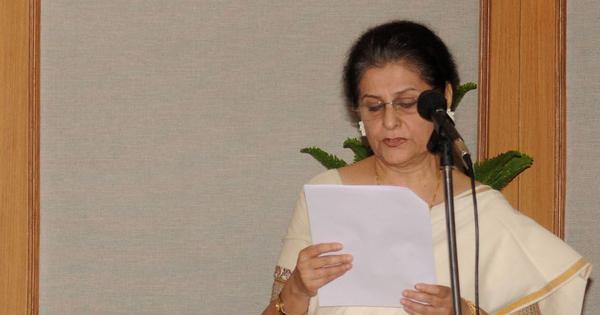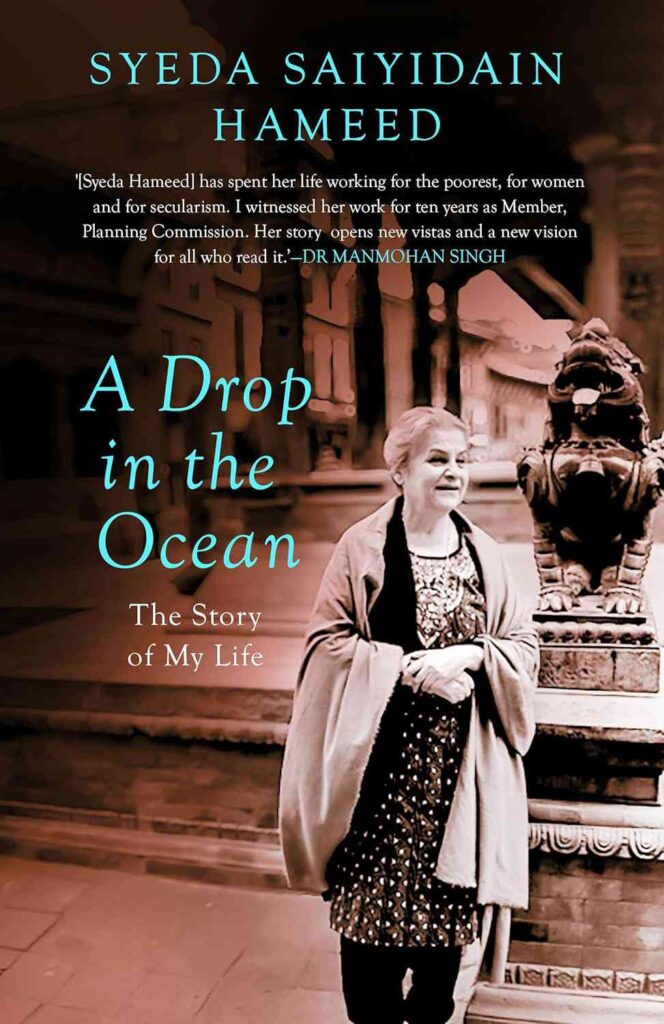Srinagar, JAMMU & KASHMIR / NEW DELHI :
An excerpt from ‘A Drop in The Ocean: The Story of My Life’, by Syeda Saiyidain Hameed.

Syeda Saiyidain Hameed. | The Prime Minister’s Office.
My sons, Morad and Yavar, were born in 1968 and 1972, respectively, and my daughter, Ayesha, in 1974. When I was pregnant with Morad, my husband said to me that he hoped for a girl in my image. But I gave birth to a robust ten-pound son! My male gynaecologist, Dr Beck’s remark is my first recollection when I regained consciousness from the Caesarean section, “Congrats, you have a little football player!” A Canadian could not have given a greater compliment. Later I realised that my husband’s desire to have a daughter had no firm basis. Holding his firstborn, he declared to all in the hospital room that from now he wanted only sons!
When I first set my eyes on Morad, I had just come out of general anaesthesia in the maternity ward of the University of Alberta Hospital. I saw his face and I can still feel my own gasp. His face was my mirror. He was lying, neatly bundled beside me. It had been a breach delivery. It took eight days for the stitches to heal before I could be discharged from the hospital. Hameed brought us home, both mother and child, wrapped and bundled. A memory that lingers is placing him on a white sofa before a large bay window overlooking the front lawn in which the grass had begun to turn brown. It was October 12, 1968.
Over the years, how did I see my older son? Introspective, and sensitive, he used to tease me by saying that his sensitivity was the result of his regressive genes! He was thoughtful, gentle, and he always had the right words for the right moment. One summer in Delhi, my children and I were at the Jamia Qabristan to recite Fatiha at their grandparents’ graves. As we waited in the drizzle for Mohammad Yunus, who was like family, to arrive to recite Fatiha for his son, Adil Shahryar, Morad must have felt the immediacy of death. “The land on which peoples’ marble is placed,” he said to me, “is incredibly fertile.” He remarked how lush and green the place was. Death, Morad said, was just a flash in this evergreen process of incarnation and reincarnation.
I think of another side of Morad: to put away his clothes, to pay his bills, to open his cheques, and to eat his packed lunches may not always happen. But he can pick up the brush and carefully clean the cobwebs. He has beautiful hands and a mane of dark curly hair. Tall like Yavar, a little stooping (which Hameed continually checked). Always a smile and word of encouragement for those around him.
“Mother, I was just thinking about you,” he said once as I came in, sweaty, rushed, and irritated.
“About me? What?”
“How beautiful you look and how much I love you.”
Sitting in my father’s home in Delhi years later, I wrote about my children in my diary. At the end of the piece on Morad, I wrote: I hope people can appreciate his quality and I hope I don’t fall into the trap of wanting to protect him. A man who has just finished studying five months of human anatomy. A man who has been running from work to school for two years. Surely, he doesn’t need his mother in that sense. Am I pig-headed?
My second son, Yavar, was born on Canada’s Dominion Day on July 1, 1972. Morad was the firstborn but Yavar was equally the joy of our life. He grew into a responsible young man, as well as a poet and an artist. One year, when I was away in India, he was invited to deliver his class valedictory address in Grade 12. He wore his father’s sherwani and delivered a beautiful speech. Why didn’t I return for the event? It remains one of the deepest regrets of my life. Through handwritten letters exchanged with him and with my sister I learnt how hard he had worked all year. Cleaning the house, mowing the lawn, hauling the garbage, washing dishes, folding laundry, and shovelling snow. Then he would sit down and compose a beautiful poem, play his guitar, paint, act, or run a marathon for the city. Initially, he had considered a career in community medicine or public health, but then he was accepted for a joint Master’s degree in law at the North Patterson School of Carleton University and the University of Ottawa. So he became a lawyer.
In 2009, I timed my return to Canada so that I could be in Ottawa for Yavar’s birthday. He received me at the train station since I had flown directly from Delhi to Toronto and taken the train from there. We drove straight to his office where I asked him about the landmark case he was fighting. Abousufian Abdelrazik was a Sudanese Canadian who was arrested in Sudan, while he was visiting his ailing mother in 2003. He was denied re-entry to Canada based on a United Nations anti-terrorism listing. The Federal Court of Canada later concluded that this arrest likely took place at the request of the Canadian Security Intelligence Service (CSIS). Though never charged, Abdelrazik was beaten, threatened, and tortured during two periods of detention totalling a year and a half. Blocked from returning to his home in Montreal, Abdelrazik went public with his story and took refuge in the Canadian Embassy in Khartoum, where he remained a virtual prisoner for fourteen months. Finally, a groundswell of public support from across Canada and a Federal Court ruling forced the government to issue permission. It was his lawyer, Yavar Hameed, my son, who fought the case with unswerving grit. He flew to Khartoum and returned home with his client.
That night I wrote in my diary: Yavar is on the brink of something big, something which will make him rise to great heights one day. I am so proud of him. His name will be up there with global crusaders for human rights.
From his office, we drove to his apartment which was across the street from the hospital where I had worked when I first stepped on Canadian soil in 1967, General Hospital on Bruyere Street. It has another name now and looks nothing like it was thirty years ago, but its sight revived some precious memories. Looking around Yavar’s well-kept apartment, I was happy to see that my three gifts were beautifully displayed. Three carpets that I had given him over the years: one from Peshawar, a Killam, one from Baku in Azerbaijan, and the third from Bokhara in Uzbekistan. The next morning, Yavar drove me to the airport. I wrote in my diary, “I am going to Edmonton with a heavy heart; it is always painful to leave Yavar.” I told him, “Yavar, you will become our torchbearer towards better climes and hemispheres. I will arrange my work so I can spend a few months with you every year.” Happiness flushed his face. At the end of my life, I say with regret that it never happened.

Excerpted with permission from A Drop in The Ocean: The Story of My Life, Syeda Saiyidain Hameed, Speaking Tiger Books.
source: http://www.scroll.in / Scroll.in / Home> Book Excerpt / by Syeda Saiyidain Hameed / October 03rd, 2024








